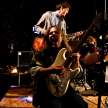The 10 Best Books Written by Vietnam War Veterans
The best books written by Vietnam War veterans offer insight into the war and first hand accounts of their experiences.

Few American military conflicts of the 20th century were as controversial as the Vietnam War. Being the first major American military blunder to happen, more or less in the public eye, it comes as no surprise that there has been a lot of literature, both fiction and nonfiction, centered around it. However, the deep division brought on by the conflict served to distort our understanding of the events and the impact it had on our country.
While many accounts are written by historians who collected the stories and experiences of those who were there, there are also a wealth of books written by Vietnam War veterans who experienced this conflict firsthand. Though it was a tragic and bloody conflict, the Vietnam War spawned some of the greatest literature of the twentieth century as well as a fervent anti-war movement.
Given the complicated nature of the war, as well as the extreme disconnect between the troops and the Pentagon, first person accounts from those involved in Vietnam are incredibly valuable. The stories of those who were fortunate to return home from the brutal war are indispensable when trying to separate false narratives from the truth. We have many things to remember from the war, such as the most memorable Vietnam War songs, but these works of literature are some of the most precious.
One of the most well-known names in the world of Vietnam historical literature, Tim O'Brien wrote this book years after the conflict. Tim O'Brien was a veteran of the war, serving in active duty in Vietnam from 1969 to 1970. Also known for releasing one of the first autobiographical accounts of combat and the war, O'Brien chose to return his thoughts to his time in the country in this book.
The book takes a bit of a philosophical approach to understanding his experiences and questions the conflict and the idea of war overall. More than anything else, the book underlines the importance of talking about one's most painful life experiences, rather than suppressing emotional responses, and the catharsis of unloading one's baggage, from the perspective of a combat veteran.
While most Americans know the broad strokes of the Vietnam War, few fully understand the true origin of the conflict and even fewer know when the US actually first got involved. Likewise, discussion of the men behind the war, the advisers who influenced it and set the policies of the conflict, is mostly limited to academic circles and those who have done extensive research on their own.
David Halberstam, who served as a full time reporter in country during the war, takes you all the way back to the origin of the unrest in Vietnam. After the Japanese had taken over the country during World War II, the returning French colonial government failed to regain stable rule. Though we would not enter the country until the mid 1950s, this was when the United States first got involved in the affairs of Vietnam. Halberstam tells the little-known story of our pre- Kennedy involvement in Vietnam, an area of history few Americans are even fully aware of.
While many combat veterans of the Vietnam War have written about the conflict, considerably less has history has been collected by the medical professionals who fought hard to save them. While many civilians held strong anti-war sentiments from what they saw and heard in the media, those who treated the wounds of the conflict saw the full impact of the brutality.
Lynda Van Devanter's Home Before Morning: The Story of an Army Nurse in Vietnam is an honest recollection of her time in country serving as a nurse for combat victims. While the violence of the battlefield was torrid and gruesome, people often forget the hellish conditions of the medical tents and hospitals that processed the wounded.
In a war of machine guns, hand grenades, and all kinds of firepower from the sky, many horrible injuries occurred. The book tells of how the war was permanently etched into her mind and how many of the medical veterans of the war were deeply scarred by their experiences in the emergency room. Medical professionals who served on the field are also Vietnam veterans.
When researching the Vietnam War, there are few better primary resources that Neil Sheehan. As a skilled war correspondent involved in Vietnam, Sheehan is often called upon and cited in books and films about the war, including Ken Burns' The Vietnam War documentary on public television.
In this publication, Sheehan talks about John Paul Vann, a Lieutenant General who played a critical role in the war. In the book, Sheehan notes Vann's desire to make the US a force for good and slowly breaks down the ultimate failure of these ambitions and their idealistic nature, a trait shared by Robert McNamara, Lyndon Johnson and many other advisers and policymakers of the American war effort. In this and other books, Sheehan sets out to explain the reasons for the failures in Vietnam for posterity.
Another great war memoir by a veteran of the United States Marines is Tobias Wolff's In Pharaoh's Army: Memories of the Lost War. Released in 1994, the book tells the story of Wolff's time in Vietnam, though it does so in a bit more of a creative and artistic way than most autobiographic accounts of the conflict.
Comprised of a number of stories aside from his active service, the narrative is far more thematic and ideological than it is linear, composed out of chronological order much like a classic Quentin Tarantino film. As it turns out, this book is technically the second volume in a deeply introspective memoir of his entire life. With such an account and the perspective of time (the book having been released in 1994), the book shows how greatly the times and the draft changed many young men's lives forever.
While many who returned from Vietnam had incredible stories and experiences to recount, the journalists who witnessed the conflict have been some of the most valuable resources in documenting the war. Another account from a veteran Vietnam war correspondent and journalist, Michael Herr's Dispatches incorporates events he observed as a firsthand witness to the brutality of the ground fight. Unlike many other great works from that time and place, Dispatches had the distinction of technically being a work of fiction.
Though many of the characters and much of the story are actually fictional, the inspiration that Herr drew from his real time in the war makes it more of a piece of historical fiction. While it is not a pristine piece of non-fiction literature, the book is still able to capture the time and place it is written about and add to our understanding of the war with a careful and accurate recreation of the day to day experience. This book was praised by the New York Times and deserves every word of the accolades.
As valuable as the accounts of the basic soldiers on the ground are in understanding the true nature and procedure of the war at large, it is also important to focus on singular events in the war, in order to understand where we have triumphed and where we have come up short. Without such a perspective, we are deprived of the knowledge gained by each victory and more importantly, the lessons of failure.
We Were Soldiers Once...and Young was co-penned by Colonel Harold G. Moore, a man who learned many lessons from his time as an officer in Vietnam. The book hones in on the battle of the Ia Drang Valley, one of the most harrowing battles of the entire war. Among many other lessons of the battle, Moore conveys how lucky he and his troops were to survive the horrible massacre and how their strategies almost got them killed. This book offers the unique perspective of a high ranking officer that was also deeply entrenched in the day to day violence of the war.
Just as the war experience of a combat nurse was fraught with gruesome sights and heart-wrenching sounds, the doctors on the front lines were confronted by a great deal of trauma. Written by Dr. John A. Parrish, 12, 20 & 5 is about his time serving as a medic during the Vietnam War. With the medical professionals responsible for treating those wounded on the battlefield, doctors and nurses alike were constantly bombarded with helicopters full of young men with horrible abdominal wounds, missing limbs, and other tragic and life-changing disfigurements and internal injuries.
In such overwhelming circumstances, medics would have to triage wounds, often forsaking those who were thought to be beyond saving. In this book, Parrish describes the sights he saw working at a marine camp and the terrible carnage he witnessed. Due to the brutality of their wounds and the shortcomings of the medical care, many who were severely wounded would never return home, dying waiting for help.
Because many of the worst failures and criminal actions of the war were covered up when they first occurred, many people of later generations fail to realize the full extent of brutality during the conflict—on both sides. While there are many books on the Vietnam War, this anthology is something much more critical. As the largest trove of leaked documents to emerge during the Vietnam War, The Pentagon Papers served to expose the worst atrocities and abject failures of the war that the government had kept from the general public.
In a time when there was no internet, the government was easily able to manipulate the reality of the war. There was no other source of coverage than the mainstream media, so exaggerations and outright lies could be told flippantly to warp and distort the public's perception of the war. Although not among books written by Vietnam War veterans, it has been edited and curated by Neil Sheehan and Hedrick Smith as an adaptation that offers the perspective of one of the foremost wartime journalists of the conflict on the documents that forever changed the war's narrative. Politics were complicated during the Vietnam War; it was a tale of two presidents.
A powerful war fiction narrative of struggle during the Vietnam War, Karl Marlantes' masterpiece was 30 years in the making. Having been a marine in the Vietnam War, Marlantes bases much of the novel on his own time in Vietnam. The book's protagonist is a second lieutenant named Waino Mellas and the story focuses on his struggle against the enemy and the futility of the Vietnam War in general.
While many people understand that the Vietnam War was physically brutal and left many veterans traumatized, they fail to recognize the underlying psychological damage of fighting an enemy who has superior knowledge of the terrain. The narrative surrounds the American's attempted retaking of a once derelict base in South Vietnam that has been found and seized by the North Vietnamese after being abandoned by the marines.
This book, easily one of the best pieces of war fiction, is definitely one of the best books written by Vietnam War veterans. Both the non-fiction and fictional tales on this list have a sense of chilling realism gleaned from firsthand experience and in-depth research.
There's a lot to be said about the Vietnam War and the impact it still has on society and culture today. There are countless things influenced by the war that we don't even realize have any relevance. For example, Rogue One: A Star Wars Story returns to the Vietnam War roots of the Star Wars franchise. No one has forgotten the Vietnam War; not society, not the surviving veterans, or the people of the nation.
About the Creator
Fred Eugene Park
Fred Park is a writer, singer and guitarist with a deep passion for music, sports and history. Fred graduated from Purchase College in 2016 with a BA in history.
Enjoyed the story? Support the Creator.
Subscribe for free to receive all their stories in your feed. You could also pledge your support or give them a one-off tip, letting them know you appreciate their work.






Comments
There are no comments for this story
Be the first to respond and start the conversation.